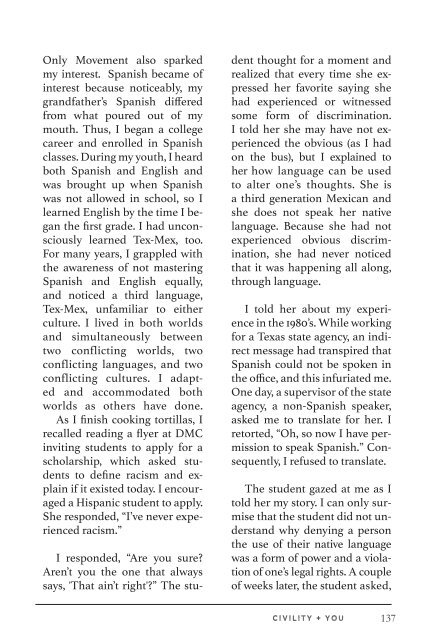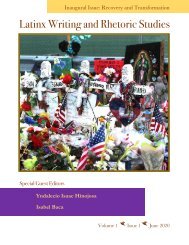You also want an ePaper? Increase the reach of your titles
YUMPU automatically turns print PDFs into web optimized ePapers that Google loves.
Only Movement also sparked<br />
my interest. Spanish became of<br />
interest because noticeably, my<br />
grandfather’s Spanish differed<br />
from what poured out of my<br />
mouth. Thus, I began a college<br />
career and enrolled in Spanish<br />
classes. During my youth, I heard<br />
both Spanish and English and<br />
was brought up when Spanish<br />
was not allowed in school, so I<br />
learned English by the time I began<br />
the first grade. I had unconsciously<br />
learned Tex-Mex, too.<br />
For many years, I grappled with<br />
the awareness of not mastering<br />
Spanish and English equally,<br />
and noticed a third language,<br />
Tex-Mex, unfamiliar to either<br />
culture. I lived in both worlds<br />
and simultaneously between<br />
two conflicting worlds, two<br />
conflicting languages, and two<br />
conflicting cultures. I adapted<br />
and accommodated both<br />
worlds as others have done.<br />
As I finish cooking tortillas, I<br />
recalled reading a flyer at DMC<br />
inviting students to apply for a<br />
scholarship, which asked students<br />
to define racism and explain<br />
if it existed today. I encouraged<br />
a Hispanic student to apply.<br />
She responded, “I’ve never experienced<br />
racism.”<br />
I responded, “Are you sure?<br />
Aren’t you the one that always<br />
says, 'That ain’t right'?” The student<br />
thought for a moment and<br />
realized that every time she expressed<br />
her favorite saying she<br />
had experienced or witnessed<br />
some form of discrimination.<br />
I told her she may have not experienced<br />
the obvious (as I had<br />
on the bus), but I explained to<br />
her how language can be used<br />
to alter one’s thoughts. She is<br />
a third generation Mexican and<br />
she does not speak her native<br />
language. Because she had not<br />
experienced obvious discrimination,<br />
she had never noticed<br />
that it was happening all along,<br />
through language.<br />
I told her about my experience<br />
in the 1980’s. While working<br />
for a Texas state agency, an indirect<br />
message had transpired that<br />
Spanish could not be spoken in<br />
the office, and this infuriated me.<br />
One day, a supervisor of the state<br />
agency, a non-Spanish speaker,<br />
asked me to translate for her. I<br />
retorted, “Oh, so now I have permission<br />
to speak Spanish.” Consequently,<br />
I refused to translate.<br />
The student gazed at me as I<br />
told her my story. I can only surmise<br />
that the student did not understand<br />
why denying a person<br />
the use of their native language<br />
was a form of power and a violation<br />
of one’s legal rights. A couple<br />
of weeks later, the student asked,<br />
Civility + You<br />
137





